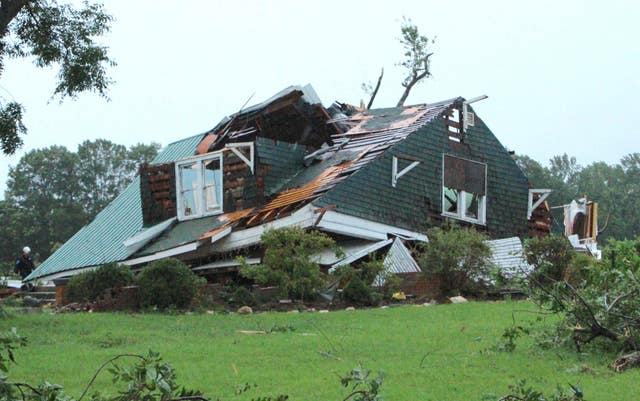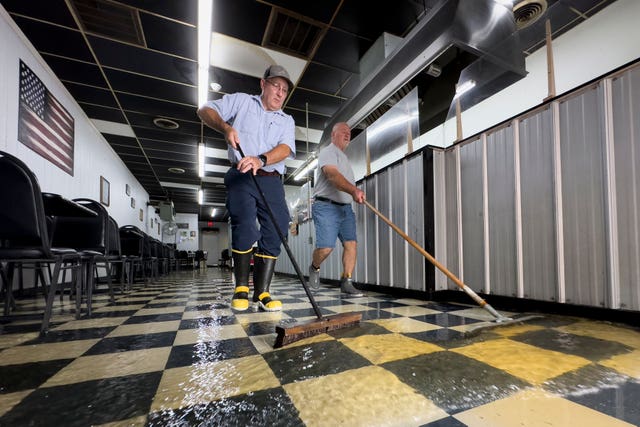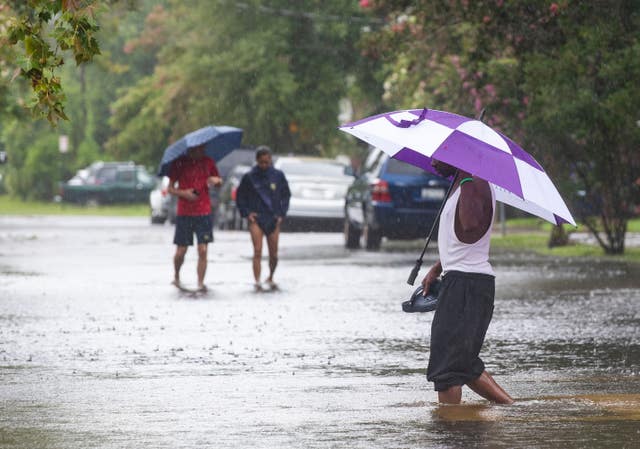The remnants of storm Debby have picked up the pace in the US, moving north and north-east from the Carolinas and still packing a punch with heavy rains, flash flooding and the threat of tornadoes.
The Mid-Atlantic states and parts of New York and New England will see significant rainfall that could cause dangerous flooding into the weekend, such as on parts of Interstate 95 near bigger cities, said Jon Porter, Accuweather’s chief meteorologist.
From eastern Virginia up to Vermont there may be an active stretch of tornadoes on Friday, he said, adding: “There will be multiple threats in Debby’s final chapter, and it’s a dangerous one.”

Flooding that hit the north-eastern part of the state on July 30 knocked out bridges, destroyed and damaged homes, and washed away roads in the rural town of Lyndon.
It came three weeks after after deadly flooding in the north and centre of the state from the remnants of Hurricane Beryl.
Debby was a tropical depression by late Thursday afternoon, the US National Hurricane Centre said. It made landfall early on Monday on the Gulf Coast of Florida as a Category 1 hurricane. Then, Debby made a second landfall early on Thursday in South Carolina as a tropical storm.

On Thursday, tornadoes spawned by Debby levelled homes, damaged a school and killed one person, as the tropical system dropped heavy rain and flooded communities across the Carolinas.
It only took 15 seconds for a tornado to devastate Genesis Cooper’s home in Lucama, North Carolina, a small town about 40 miles east of Raleigh. He almost slept through it — if not for an alert on his wife’s phone.

“I can’t even describe it. It’s like, suction, that’s what it felt like,” Mr Cooper said. “Like something is squeezing, like your ears are popping.”
The tornado was one of at least three reported in North Carolina, and perhaps the most devastating. One person was found dead in a home damaged by the Lucama tornado, Wilson County spokesperson Stephen Mann said.
The superintendent of Wilson County Schools confirmed damage at Springfield Middle School, where sections of the walls and roof are gone or compromised.
Heavy rain and flash flooding will continue tonight throughout much of the Mid-Atlantic and central Appalachians associated with T.D. Debby. Be sure to have multiple ways of receiving warnings and travel with extreme caution. Most #flood fatalities occur while driving! https://t.co/b378gKeoiE pic.twitter.com/dujRp0ObYm
— NWS Weather Prediction Center (@NWSWPC) August 9, 2024
Drone footage showed portions of the school’s roof ripped off, exposing rafters and duct work. A section of wall had crumbled onto the soggy green lawn, which was strewn with twisted pieces of metal roof and shredded insulation.
Tornado warnings continued to be issued throughout North Carolina and Virginia into the night on Thursday. A tornado watch was in effect for over 17 million people in parts of Washington, DC, Maryland, North Carolina, Virginia and West Virginia until 7am on Friday (12pm, BST).
Meanwhile, a dam north of Fayetteville, North Carolina, broke Thursday morning as Debby drenched the area. Between 12 and 15 homes were evacuated, but no-one was injured and no structures were damaged, Harnett County spokesperson Desiree Patrick said.

About 100 miles south of Lucama, deputies in Bladenboro posted photos of a patrol car damaged by a fallen tree, as well as roads that had been washed out.
More flooding is expected in North and South Carolina. Up to 6in of rain could fall before Debby clears those states. Parts of Maryland, upstate New York and Vermont could get similar rainfall totals by the end of the weekend, the weather service said.
A MODERATE risk is in effect in our Day 1 Excessive Rainfall Outlook. More details: https://t.co/FQU5sbmsxo pic.twitter.com/z0DZFVgsRR
— NWS Weather Prediction Center (@NWSWPC) August 9, 2024
South Carolina governor Henry McMaster warned on Thursday that Debby’s effects were not completely over because rain falling in North Carolina could swell rivers and cause flooding downstream.
Mr McMaster said: “We’ve passed some dangers, but there’s still plenty.
“So don’t let your guard down yet.”






